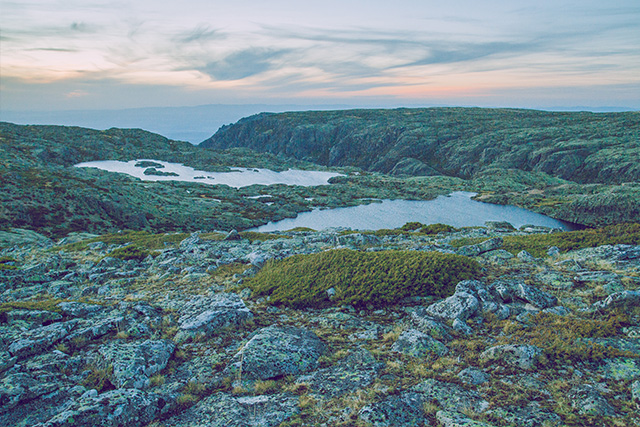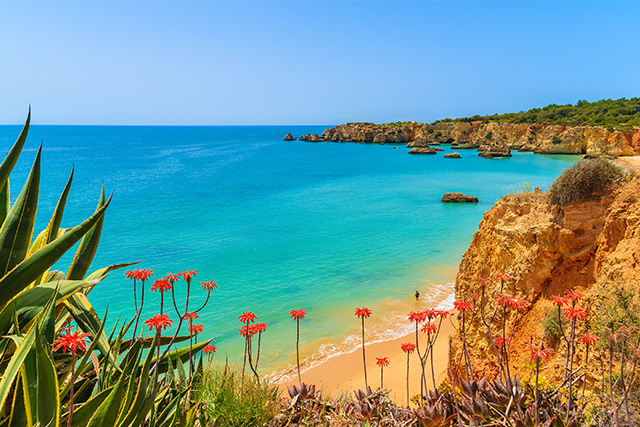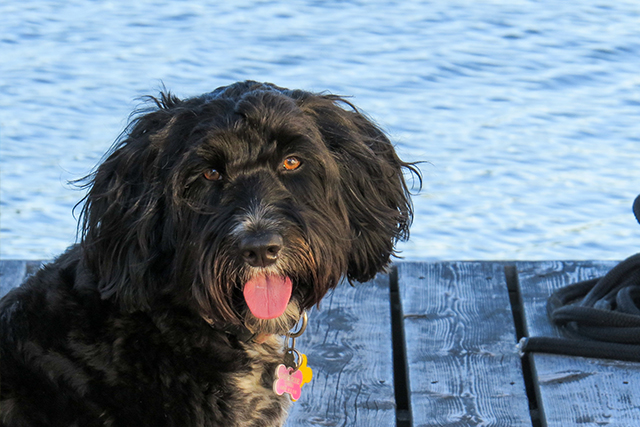With a population of just over 10 million people, Portugal is a small country where you can experience contrasting landscapes, colours and cultural heritage in one visit. But don’t just take our word for it; we met up with Elsa Mendes from the Portuguese National Tourist Office to get her take on what makes Portugal the perfect place to explore on foot or by bike.
The friendly chirp of Elsa’s voice carries down the corridor at Headwater HQ as I approach the room where she is enthusiastically telling our product and marketing teams about new developments, up-and-coming regions and general life in Portugal. As a fairly new member of the Headwater team, I was keen to find out more about the country and the regions that we operate in – and she certainly inspired me!
Magic moments
There are many magical moments to be had in Portugal, Elsa explains. Walking or cycling along the most preserved coast of Europe on the Vicentina Route you can view a unique landscape from the top of the cliffs or watch the sun set from the top of Cabo Sardão, go with the fishermen to the sea and feel a live seabream in your hands, or eat freshly-caught barbecued fish in one of the restaurants, washed down with an accompanying white wine.
Local life
It’s not only the climate that is warm, its people are also warm. In the charming small, traditional white villages that dot parts of the country, you’ll bump into the friendly locals who are hospitable and genuinely want to talk to you. They’re authentic and accommodating towards tourists, always open to a chat. In these villages the locals meet every Sunday for church.

Serra da Estrela National Park.
History
Having technically been a country since 1143, Portugal has an impressive history, many features which can be found in beautiful museums, and its 19 UNESCO World Heritage sites, including historic centres, archaeological sites, cultural landscapes and natural parks. The islands of Portugal were formed millions of years ago by volcanic activity and there are many caves made of lava and stunning formations and contrasting sands to enjoy. These giant rock formations have so much history packed into the ripples of the rocks.
Diverse regions
With seven distinct regions in the country, there are many different experiences to be had. The landscape changes dramatically within an hour or two and travelling around the country, you’ll be able to see mountains and parks, natural parks, cities and historical villages and beaches all along the national coastline. The Azores archipelago is an incredibly rich destination for nature-lovers – natural reserves, lakes and volcanic lagoons are just some of the unspoilt highlights.

Tropical flowers on beautiful Praia da Rocha beach, Algarve, Portugal.
Beaches
Portugal’s beaches are stunning and diverse, says Elsa. In the Algarve you can almost believe you’re in a different country when comparing the beautiful beaches to the Monchique Mountain or the Ria Formosa Natural Park. And in Madeira archipelago, the long gold sandy beach in Porto Santo island is not far from the green of the levadas and the Laurisilva Forest. Then there are the dark volcanic sands of the Azores.
Did you know?
Walking and cycling trails
In south-west Portugal there are 250 miles of walking trails along the well-preserved coastline, including the Historical Way, the Fishermen’s Trail and several Circular Routes. This unique experience takes you between two different worlds – a living and authentic rural culture and a surprisingly wild coastline. The Algarve Way is another route spanning 200 miles, which starts in Alcoutim and culminates at the Cabo de São Vicente – marking the most south-westerly point of Europe. Here you can visit the lighthouse, museum and small bar and take some photographs. For cyclists, the Ecovia is a national cycle trail connecting Vila Real de Santo Antonio to the Cabo de São Vicente.

Delicious, fresh fish on the BBQ in Portugal.
Varied and affordable cuisine
Portugal’s cuisine is as rich and varied as its landscape. From Michelin starred restaurants (there are currently 23) to small typical family-owned restaurants, there is a food to please all tastes, Elsa explains. The success of the country’s gastronomy lies in the fresh local ingredients. The most distinctive feature of Portuguese cuisine comes from the sea – cataplana, bacalhau (dried salted cod) and sardines are traditional dishes. It is said that there are 1,001 ways to cook codfish in Portugal, including with olive oil, which is part of every dish in the country. Meat is also important, Elsa continues. Due to the country’s thriving cork industry, semi-wild black pigs grow fat on a diet of acorns dropped by the forests of cork oaks across the southern Alentejo region. Cured hams (presunto) and porco preto are appreciated worldwide. The sun-ripened fruit is delicious too, grown all over, from the Madeiran bananas and passion fruit to the cherries from the Serra da Gardunha mountains and melons raised on scorched summer plains beside the River Tagus.
If you have a sweet tooth, a pastel de nata (custard tart) is a must-try – delicious with a coffee, which the Portuguese drink in the form of espresso.
Saudade
Definition: A feeling of longing, melancholy or nostalgia, characteristic of the Portuguese temperament. Upon leaving Portugal, Elsa says you may feel like you want to go back again very soon, you will feel drawn back to the people, weather and the culture.
Still not made up your mind? Here’s a picture of a Portuguese water dog…

Have I made you smile?
Headwater offer nine holidays in Portugal – take a look for yourself.